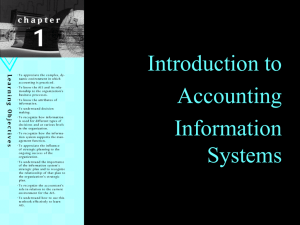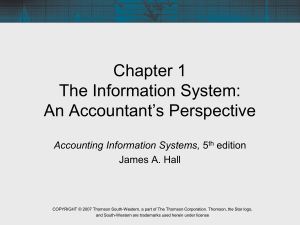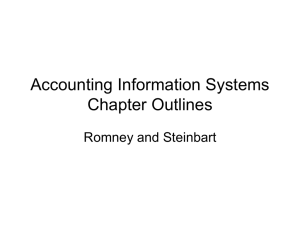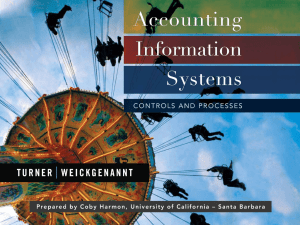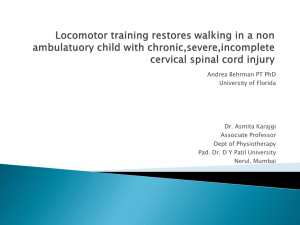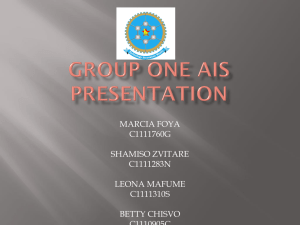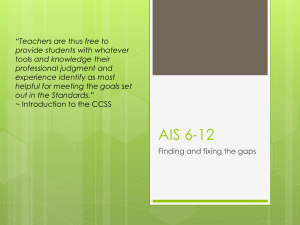Patterns and Algebra in Stages 3 and 4
advertisement
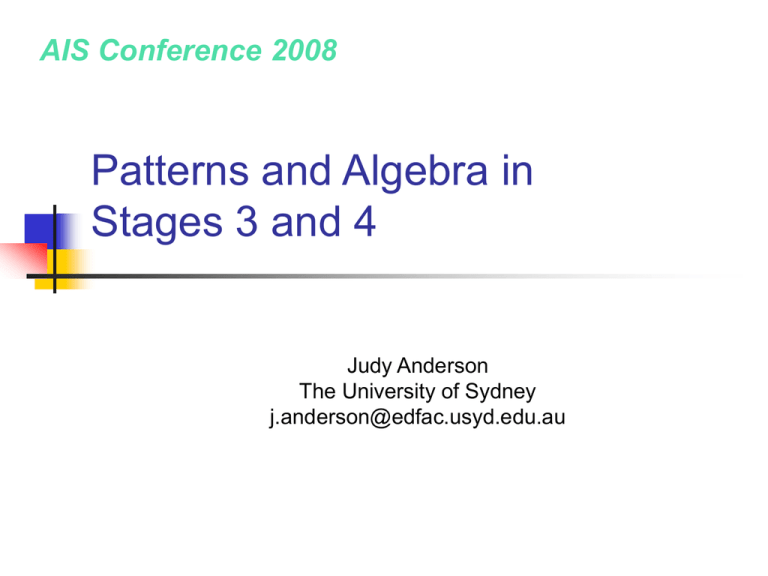
AIS Conference 2008 Patterns and Algebra in Stages 3 and 4 Judy Anderson The University of Sydney j.anderson@edfac.usyd.edu.au Patterns and Algebra in K–10 Expressing generality (x + y = y + x) Using and interpreting functions ( y = 3x ) Solving equations ( 3x – 1 = 5) AIS Conference 2008 2 How can we begin? Some magic … A story … An everyday situation … A puzzle … An investigation … AIS Conference 2008 3 The Magic of Numbers Think of a number between 1 and 64 Write down everything you can about your number Share this with a friend – can you think of any other interesting things about these two numbers? Finding your number … AIS Conference 2008 4 A long time ago … A mathematician invented the game of chess and presented it to the king. The king was so pleased with the game that he asked the mathematician to name a reward. The mathematician looked at the chessboard, consisting of 64 squares, and asked for some rice according to the rule: “One grain of rice on the first square, 2 grains of rice on the second square, 4 grains on the third square, 8 on the fourth and so on … until the last square.” The king thought that the mathematician was a bit simple, so he readily agreed and sent for the rice from the royal warehouse. How much rice did the king need? AIS Conference 2008 5 Everyday number patterns I noticed the other morning when hanging some clothes on the line that I hang each item separately with two pegs per item. How many pegs would I need to hang 1 item, 2 items, 5 items, 30 items, and so on? How would you describe this pattern in words? AIS Conference 2008 6 The clothesline – A peggy problem! When I was a kid in the country, I used two pegs for the first towel, and then one new peg for each additional towel. How many pegs are required for 1 item, 2 items, 5 items, 30 items, and so on? Mum used to overlap the towels but she would put an extra peg in the middle of each towel. What does the pattern look like now? AIS Conference 2008 7 Think of a number … Add 2 Multiply by 4 Subtract 4 Divide by 4 Subtract the number your started with What is the answer? Use Algebra to show how this works? AIS Conference 2008 8 Another think of a number … Think of a number between 2 and 10 Multiply it by nine Add the two digits of your answer Subtract five Choose a letter of the alphabet corresponding to the number … AIS Conference 2008 9 Calendar Patterns June 2008 Sun Mon Tues Wed Thurs Fri Sat 1 2 3 4 5 6 7 8 9 10 11 12 13 14 15 16 17 18 19 20 21 22 23 24 25 26 27 28 29 30 31 AIS Conference 2008 10 Calendar Patterns June 2008 Sun Mon Tues Wed Thurs Fri Sat 1 2 3 4 5 6 7 8 9 10 11 12 13 14 15 16 17 18 19 20 21 22 23 24 25 26 27 28 29 30 31 AIS Conference 2008 11 Calendar Patterns June 2008 Sun Mon Tues Wed Thurs Fri Sat 1 2 3 4 5 6 7 8 9 10 11 12 13 14 15 16 17 18 19 20 21 22 23 24 25 26 27 28 29 30 31 AIS Conference 2008 12 Algebraic thinking … Patterns and Algebra Generating and investigating patterns Observing, predicting and proving Working Mathematically Describing relationships Questioning Making generalisations and proving results Applying Strategies Communicating Using and applying algebraic symbolism to solve problems Reasoning Reflecting AIS Conference 2008 13 The developmental sequence Early Stage 1 Stage 1 Stage 2 Stage 3 Stage 4 AIS Conference 2008 14 Building foundations for Algebra in K – 6 Mathematics Number Patterns – pattern work leads to expressing generality eg continue the pattern 3, 6, 9, 12, …. 1, 4, 9, 16, ….. Number Relationships –building understandings of number and operations is also very important AIS Conference 2008 15 Building foundations includes: Understanding the properties of numbers and operations Using all numbers, not just whole numbers Seeing the operations, not just the answers 125 5 = • • 4 + 1 =• x 5 = 125 +2 AIS Conference 2008 16 What’s my rule? AIS Conference 2008 17 Activity Generate three different number patterns that include the number 12. Try to use different kinds of numbers and different operations. Look at one of your neighbour’s patterns and find the next three numbers in the pattern. AIS Conference 2008 18 Questions to pose: What number comes next? How do you know? What number will be 10th? How do you know? Can you predict the 20th number? How could you check if you are correct? Does the number ‘x’ belong to this pattern? AIS Conference 2008 19 Consider investigating other patterns 16 - 9= 26 - 9 = 36 - 9 = continue, predict other cases and explain The aim of pattern work is to: develop facility and flexibility with numbers build intuitive understanding of properties. AIS Conference 2008 20 Stage 3 Build simple geometric patterns involving multiples Complete a table of values for geometric and number patterns Number of Triangles 1 2 3 5 6 7 Number of Sides 3 6 9 12 15 - - 4 AIS Conference 2008 21 Describe a pattern in words in more than one way Number of Triangles 1 2 3 5 6 7 Number of Sides 3 6 9 12 15 - - 4 (determining a rule to describe the pattern from the table) ‘It looks like the 3 times tables.’ ‘You multiply the top number by three to get the bottom number.’ AIS Conference 2008 22 Construct, verify and complete number sentences involving the four operations with a variety of numbers completing number sentences: 5 + • = 12 – 4 7 •= 7.7 constructing number sentences to match a word problem checking solutions and describing strategies AIS Conference 2008 23 Learning about using inverse operations I think of a number, multiply it by 3, take away 9 and then divide by 5. The answer is 3. What was the number I thought of? ( ( 3 - 9) 5 ) = 3 Answer: 8 AIS Conference 2008 24 Example of “backtracking” I think of a number, multiply it by 3, take away 9 and then divide by 5. The answer is 3. What was the number I thought of? 3 -9 5 3 AIS Conference 2008 25 Stage 4 - Introducing Pronumerals K is the number of letters in your name - so always stands for a number K takes multiple values (unknown or variable) AIS Conference 2008 26 2 (g + 4) = g+4+g+4 = g+g+8 = 2g + 8 AIS Conference 2008 27 2 (n+n+6) (2 + n) 2 + 6 AIS Conference 2008 28 x 1 2 3 4 5 6 7 y 1 5 9 13 17 21 25 Describe this pattern in words? Describe this pattern using symbols? What is the value of the 10th, 20th, 50th, 100th terms? Compare your answers. Discuss any differences to clarify who has predicted correctly. AIS Conference 2008 29 Functional Thinking: Students have difficulty connecting the top number with the bottom number Common errors: “x goes up by 1 and y goes up by 4” x+1= y + 4 “ y starts at one and you keep adding 4” x = 1 + 4y Algebra is not a personal shorthand to jot things down Algebra cannot be used to express all patterns AIS Conference 2008 30 Students need to develop mature operations Counting Adding AIS Conference 2008 Multiplying 31 Algebra resources … Syllabus and Sample Units of Work DET Patterns and Algebra RIC pattern books (Paul Swan) Origo algebra books (Elizabeth Warren) AAMT Others??? AIS Conference 2008 32
